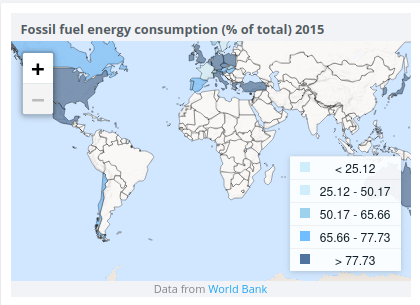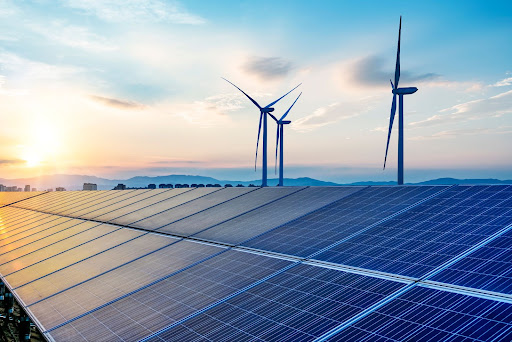Change is sweeping across Europe - the rise of Renewable Energy Sources (RES) is a game-changer.
Picture this: wind and solar power, in the past year, outshone gas to become the top energy source in the European Union, contributing over a fifth of all electricity. This game-changing data, from a report by energy think tank Ember, indicates a turning point. In 2023, solar and wind power will keep growing, while fossil fuel production is expected to drop by 20%.
Picture this: wind and solar power, in the past year, outshone gas to become the top energy source in the European Union, contributing over a fifth of all electricity. This game-changing data, from a report by energy think tank Ember, indicates a turning point. In 2023, solar and wind power will keep growing, while fossil fuel production is expected to drop by 20%.
So, why all this buzz about renewable energy?
We're determined to go green and reduce our carbon footprint. To do that, we need to build more solar and wind farms. These projects are the backbone of our transition to cleaner energy. The perks are clear - we gain more energy independence, enjoy a steadier and greener electricity market, save on costs, and increase security for homes and businesses.
Challenges and Goals for Renewable Energy

But there are challenges, too. When rushing to put up solar panels and wind turbines everywhere, we must ask: Is there enough suitable land? Can we keep the supply chain running smoothly and still make a profit?
And here's another thing - it's a giant financial leap. We could only do it within the EU's tight deadlines with some help from the government and various funds.
Here's the big goal: According to an agreement between the European Parliament and the Council, by 2030, 42.5% of the energy we use in Europe must come from renewable sources. This is a huge jump from where we are now. It brings us closer to the goals we set in the European Green Deal and REPowerEU.
This agreement shows that we're serious about securing our energy future, reducing greenhouse gas emissions by 55% by 2030, and cutting down on fossil fuel imports. As renewable energy keeps growing across electricity generation, industry, buildings, and transport, we'll see energy prices drop and rely less on fossil fuels. Europe is on the path to a greener, more sustainable future.
And here's another thing - it's a giant financial leap. We could only do it within the EU's tight deadlines with some help from the government and various funds.
Here's the big goal: According to an agreement between the European Parliament and the Council, by 2030, 42.5% of the energy we use in Europe must come from renewable sources. This is a huge jump from where we are now. It brings us closer to the goals we set in the European Green Deal and REPowerEU.
This agreement shows that we're serious about securing our energy future, reducing greenhouse gas emissions by 55% by 2030, and cutting down on fossil fuel imports. As renewable energy keeps growing across electricity generation, industry, buildings, and transport, we'll see energy prices drop and rely less on fossil fuels. Europe is on the path to a greener, more sustainable future.
The Role of Hydrogen in Achieving Renewable Energy Goals
As Europe strides confidently towards its ambitious renewable energy targets, the role of hydrogen in this green revolution is crucial. Hydrogen is poised to play a pivotal role in achieving and sustaining these renewable energy goals.
1. Hydrogen as an Energy Carrier
Hydrogen is a versatile energy carrier that we can produce through various methods, including renewable electricity electrolysis. This method is an excellent candidate for storing excess energy from intermittent wind and solar power sources. During high renewable energy production periods, businesses can use surplus electricity to produce hydrogen, effectively storing energy for later use. When the sun isn't shining, and the wind isn't blowing, we can convert the stored hydrogen back into electricity or use it as a clean fuel for various applications.
2. Decarbonizing Hard-to-Electrify Sectors
While renewables have made significant strides in decarbonising the electricity sector, other sectors, such as heavy industry, aviation, and long-haul transport, remain challenging to electrify directly. Hydrogen offers a clean alternative in these hard-to-electrify sectors. For example, green hydrogen, produced using renewable energy, can replace fossil fuels in industrial processes and serve as a clean fuel for trucks, ships, and other vehicles. This possibility diversifies the use of renewable energy beyond the power grid.
3. Enhancing Energy Grid Resilience
The integration of hydrogen into the energy system enhances grid resilience and stability. Hydrogen can act as a buffer, absorbing excess renewable energy during surplus and releasing it when demand is high. This technology helps balance the grid and ensures a reliable energy supply, even when renewable sources are variable. It reduces the need for backup power sources and can contribute to a more robust and resilient energy infrastructure.
4. International Collaboration
Borders do not limit the transition to renewable energy; hydrogen can facilitate international collaboration. Europe can export its surplus renewable energy in hydrogen to regions with high energy demand or partner with neighbouring countries to develop cross-border hydrogen infrastructure. This fact fosters energy security and promotes diplomatic and economic ties.
5. A Green Hydrogen Economy
To fully realise the potential of hydrogen, Europe is investing heavily in developing a green hydrogen economy. Governments, research institutions, and industries are collaborating to scale green hydrogen production, reduce costs, and advance hydrogen technologies. The investment includes:
In conclusion, hydrogen is a critical enabler in Europe's journey towards a greener, more sustainable energy future. Its ability to store and transport renewable energy, decarbonise challenging sectors, enhance grid resilience, and foster international collaboration positions it as a critical component of Europe's renewable energy strategy.
As Europe transitions from fossil fuels towards renewables, hydrogen will play a central role in realising these ambitious goals and securing a cleaner, more sustainable energy future for all. Europe is indeed on the right path towards achieving its renewable energy objectives, with hydrogen as a vital ally in this transformative journey.
1. Hydrogen as an Energy Carrier
Hydrogen is a versatile energy carrier that we can produce through various methods, including renewable electricity electrolysis. This method is an excellent candidate for storing excess energy from intermittent wind and solar power sources. During high renewable energy production periods, businesses can use surplus electricity to produce hydrogen, effectively storing energy for later use. When the sun isn't shining, and the wind isn't blowing, we can convert the stored hydrogen back into electricity or use it as a clean fuel for various applications.
2. Decarbonizing Hard-to-Electrify Sectors
While renewables have made significant strides in decarbonising the electricity sector, other sectors, such as heavy industry, aviation, and long-haul transport, remain challenging to electrify directly. Hydrogen offers a clean alternative in these hard-to-electrify sectors. For example, green hydrogen, produced using renewable energy, can replace fossil fuels in industrial processes and serve as a clean fuel for trucks, ships, and other vehicles. This possibility diversifies the use of renewable energy beyond the power grid.
3. Enhancing Energy Grid Resilience
The integration of hydrogen into the energy system enhances grid resilience and stability. Hydrogen can act as a buffer, absorbing excess renewable energy during surplus and releasing it when demand is high. This technology helps balance the grid and ensures a reliable energy supply, even when renewable sources are variable. It reduces the need for backup power sources and can contribute to a more robust and resilient energy infrastructure.
4. International Collaboration
Borders do not limit the transition to renewable energy; hydrogen can facilitate international collaboration. Europe can export its surplus renewable energy in hydrogen to regions with high energy demand or partner with neighbouring countries to develop cross-border hydrogen infrastructure. This fact fosters energy security and promotes diplomatic and economic ties.
5. A Green Hydrogen Economy
To fully realise the potential of hydrogen, Europe is investing heavily in developing a green hydrogen economy. Governments, research institutions, and industries are collaborating to scale green hydrogen production, reduce costs, and advance hydrogen technologies. The investment includes:
- Building hydrogen production facilities.
- Expanding refuelling infrastructure for hydrogen-powered vehicles.
- Promoting research into innovative hydrogen applications.
In conclusion, hydrogen is a critical enabler in Europe's journey towards a greener, more sustainable energy future. Its ability to store and transport renewable energy, decarbonise challenging sectors, enhance grid resilience, and foster international collaboration positions it as a critical component of Europe's renewable energy strategy.
As Europe transitions from fossil fuels towards renewables, hydrogen will play a central role in realising these ambitious goals and securing a cleaner, more sustainable energy future for all. Europe is indeed on the right path towards achieving its renewable energy objectives, with hydrogen as a vital ally in this transformative journey.
Businesses Partnering with Hydrogenera
Businesses partnering with Hydrogenera gain a competitive edge in the evolving energy landscape. By adopting hydrogen solutions, companies can position themselves as leaders in sustainability, reduce their reliance on fossil fuels, and contribute to a greener future. Hydrogen also offers the advantage of energy security by reducing vulnerability to energy supply disruptions.
Furthermore, as government incentives and regulations increasingly favour green energy solutions, businesses that embrace hydrogen technologies are well-positioned to access financial support and regulatory benefits, which can lead to significant cost savings in the long term.
In conclusion, Hydrogenera's expertise in hydrogen technologies provides businesses with the tools and knowledge to thrive in the rapidly changing energy landscape. With its comprehensive approach to the hydrogen supply chain, Hydrogenera empowers enterprises to transition to clean energy solutions, reduce their environmental impact, and stay ahead in an increasingly green-focused world.
As Europe forges ahead with its renewable energy goals, companies partnering with Hydrogenera are poised to be leaders in the renewable energy revolution, setting an example for sustainable and responsible business practices.
At Hydrogenera, we understand that technological advancement occurs within a broader context. We are here to provide guidance, facilitate seamless transitions, and offer a range of roles to support your hydrogen endeavours. Whether you are exploring media inquiries, seeking investor relations, considering business opportunities, or have general questions about hydrogen technologies, Hydrogenera is your go-to partner.
Don't hesitate to get in touch with us.
🌍⚡ #RenewableEnergy #CleanEnergy #GreenFuture #EUClimateGoals
Furthermore, as government incentives and regulations increasingly favour green energy solutions, businesses that embrace hydrogen technologies are well-positioned to access financial support and regulatory benefits, which can lead to significant cost savings in the long term.
In conclusion, Hydrogenera's expertise in hydrogen technologies provides businesses with the tools and knowledge to thrive in the rapidly changing energy landscape. With its comprehensive approach to the hydrogen supply chain, Hydrogenera empowers enterprises to transition to clean energy solutions, reduce their environmental impact, and stay ahead in an increasingly green-focused world.
As Europe forges ahead with its renewable energy goals, companies partnering with Hydrogenera are poised to be leaders in the renewable energy revolution, setting an example for sustainable and responsible business practices.
At Hydrogenera, we understand that technological advancement occurs within a broader context. We are here to provide guidance, facilitate seamless transitions, and offer a range of roles to support your hydrogen endeavours. Whether you are exploring media inquiries, seeking investor relations, considering business opportunities, or have general questions about hydrogen technologies, Hydrogenera is your go-to partner.
Don't hesitate to get in touch with us.
- For Business Inquiries: If you're considering integrating hydrogen technologies into your operations, sales@hydrogenera.eu is the email to contact. We can discuss how hydrogen solutions can enhance your business's sustainability and profitability.
- For General Inquiries: For any other questions or information, don't hesitate to contact us at info@hydrogenera.eu. Our team is here to provide the answers and insights you need to make informed decisions about hydrogen adoption.
🌍⚡ #RenewableEnergy #CleanEnergy #GreenFuture #EUClimateGoals
